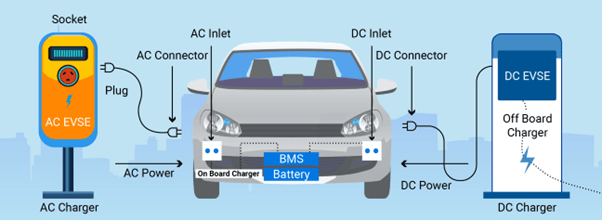Electric Vehicle Charging Station Network Solutions
Electric Vehicles are the talk of the town now! However, maintaining an Electric Vehicle can be a little tricky. Drivers are required to charge their Electric Vehicles at home and away, which means they need access to charging points in residential and public place such as fuelling stations and workplaces. Charging can be done either by AC (alternating current) or DC (direct current).
At Embitel, we are committed to providing technology solutions that meet the unique needs of our clients. With our expert team and cutting-edge technology, we deliver solutions that drive success and exceed expectations. Before we explore our comprehensive range of software solutions, let’s quickly go through the types of EV charging stations.
Drop a message for a free consultation with our industry experts
Knowledge bytes
Electric Vehicle AC Charging Stations
- AC charging stations are the most affordable type of charging infrastructure to install because AC is available straight from the Power-grid. It can be either single-phase or three-phase (for greater power transfer).
- The current from an AC charger must be converted from AC to DC before it can be used to power the EV battery. To make this happen, the current is passed through the EV’s onboard charger (OBC), which regulates the voltage and current. The speed of charge depends on the OBC’s power output.
- For example, if an EV is charged with a relatively powerful 22 kW AC charger (Type-2 AC charger connector), the power the battery receives – and therefore how quickly it reaches capacity – depends on the capabilities and limitations of the OBC.
Electric Vehicle DC Charging Stations
- DC charging is found at dedicated DC charging points away from home, which offer higher power and faster charging speeds. In DC charging, the energy is sent directly to the battery, bypassing the potentially limiting OBC.
- DC chargers power range start from 20 kW to more than 150 kW in line with the wider availability of bigger EV battery capacities.
- DC charging offers higher power and faster charging speeds, and this is why it tends to be found at commercial charging points.

Charging Station Network Manager – Our Expertise
Embitel provides an all-in-one software management system that enables EV charging operators to seamlessly manage the following tasks –

Manage customers, access control and pricing.

Manage private & public Electric Vehicle (EV) charging stations, their visibility and access rights.

Manage financial rules (as per the Government Regulations), energy costs and payment through multiple channels.

Embitel’s IoT based EV Charging Network Solutions – Charging Station Network Solutions Applications
Embitel developed a solution for Electric Vehicle charging stations including the following Avant Garde features –
- All charging station installations can be remotely tracked in a centralized facility.
- Real-time health monitoring of all ports and sockets in each charging station can be carried out.
- Utilization analysis of each charging station is now possible, using this IoT based solution.
- In response to theft and vandalization, a retrofittable sliding lockable door is provided to make the installation secure.
FAQs
Ans. An Electric Vehicle charging station network is a system of charging stations specifically designed for Electric Vehicles. These charging stations are strategically placed in various locations, such as public areas, parking lots, and along highways, to provide convenient access to charging infrastructure for EV owners.
Ans An EV charging station network consists of charging stations equipped with electrical outlets or connectors compatible with EVs. EV owners can locate these charging stations through mobile apps, websites, or navigation systems integrated with the network. Once located, users can plug their EVs into the charging station, and the station delivers electricity to the vehicle’s battery to recharge it.
Ans EV charging station networks typically offer different types of charging stations to accommodate various EV charging needs. These may include Level 1 chargers (120V outlets), Level 2 chargers (240V outlets), and DC fast chargers. Level 1 and Level 2 chargers are suitable for overnight charging at home or longer stops, while DC fast chargers provide rapid charging for quick top-ups during long-distance travel.
Ans: Most EV charging station networks provide user-friendly mobile apps or websites that enable EV owners to locate nearby charging stations. These platforms display real-time information about the availability, location, charging speed, and pricing of each charging station. Users can also check the compatibility of the charging station with their EV and initiate charging sessions remotely in some cases.
Ans: While some EV charging station networks require a subscription or membership, many also offer pay-as-you-go options for non-subscribers. Subscriptions often provide benefits such as discounted charging rates, access to exclusive charging stations, and enhanced customer support. Non-subscribers can typically use the charging stations by paying with a credit card or mobile payment system.
Ans: EV charging station networks strive to provide reliable charging infrastructure to ensure EV owners can charge their vehicles whenever needed. However, the reliability of a network can vary depending on factors such as the network’s coverage, maintenance practices, and user demand. Established networks with multiple charging stations and positive user reviews generally offer higher reliability and availability.

